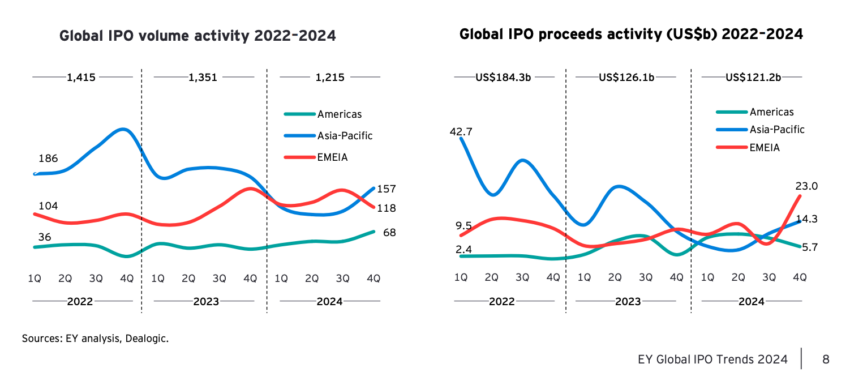Asian Crypto Giants Charge Toward US IPOs: Navigating Unprecedented Opportunities and Hidden Risks in 2025
Wall Street's latest gold rush just got an Eastern twist.
Asian cryptocurrency firms—flush with regional growth but hungry for global capital—are making aggressive moves toward US public offerings. These aren't timid exploratory filings; they're full-throttle preparations for listings that could reshape market dynamics.
The Regulatory Gauntlet
Navigating SEC scrutiny requires more than polished whitepapers. Firms face intense pressure to demonstrate compliance frameworks that satisfy both Asian regulators and notoriously demanding US standards. Some quietly hire former SEC officials as advisors—because nothing says regulatory preparedness like hiring the cops who used to chase you.
Market Timing Plays
With crypto valuations showing renewed strength, companies race to capitalize before the next cycle turns. They're packaging growth stories around institutional adoption and Web3 infrastructure—because apparently 'we trade magic internet money' doesn't play well in S-1 filings.
Investor Appetite vs. Reality Checks
While venture capitalists cheer from sidelines, public market investors approach with measured skepticism. The pitch? Exponential growth meets mature governance. The reality? Most still can't explain how their tokens avoid being classified as securities—but they'll sure try during roadshows.
This IPO wave represents crypto's awkward adolescence: dressing up decentralized ideals in suits to please traditional finance, all while hoping nobody notices the inherent contradictions. Because what's more American than monetizing revolutionary technology through conventional Wall Street machinery?
OKX, Animoca, Bithumb Rush for US Debut
:
OKX IPO reports sparked a 5% rise in its OKB token. The exchange, a major Asian player, has overhauled its compliance structure and now seeks to test U.S. markets.
Coincheck Nasdaq is no longer speculation. In December 2024, the Japanese exchange began trading publicly under the ticker CNCK after completing its de-SPAC merger. It became the first Japan-based crypto exchange to reach Nasdaq, raising funds earmarked for technology and acquisitions.
Animoca listing discussions continue. The Hong Kong-based Web3 investor aims to extend its brand from gaming and NFTs into the broader financial ecosystem, with Wall Street serving as a gateway to institutional capital.
Bithumb spin-off confirms its bid to streamline operations. By separating its exchange business, the Korean platform hopes to provide investors with a transparent earnings profile before considering a US debut.
Meanwhile, LBank IPO ambitions highlight the determination of mid-sized players to join the race. Although smaller in scale, LBank’s expansion in Southeast Asia positions it as a candidate for investors seeking exposure to emerging-market crypto adoption.
2014 Alibaba IPO Left an Exemplary Case
: The precedent is strong. Alibaba’s IPO in 2014 demonstrated how Asian firms can thrive in the U.S., while Coinbase’s debut in 2021 legitimized crypto companies by proving that exchanges could withstand regulatory scrutiny and attract institutional demand. Nevertheless, Asia’s home regulations remain fragmented and often restrictive, making the U.S. the most transparent and liquid venue for ambitious crypto firms.

: Several factors explain the surge, and together they show why the current momentum is so significant:
- Market sentiment: A broad recovery in IPO appetite is underway. “These are the best market conditions the crypto space has seen in years, and companies want to take advantage of that,” said Matt Kennedy, senior strategist at Renaissance Capital. Investor optimism, combined with a pro-crypto regulatory posture in Washington, is fueling the boom.
- Asia’s growth role: The region hosts one of the fastest-growing crypto sectors. EY reports show that Asia-Pacific IPO values rebounded in double digits in late 2024, underscoring its momentum. Moreover, global data emphasizes the US market’s appeal for foreign companies. According to EY, 55% of all U.S. public listings in 2024 came from foreign issuers.
- Capital and valuation: OKX listing could command multiples impossible in regional markets.
- Regulatory credibility: Animoca’s compliance with SEC standards would signal strong trust.
- Flexible routes: Coincheck’s de-SPAC showed how alternative structures can shorten time-to-market.
- Global branding: Bithumb IPO ambitions reflect the ceiling on domestic growth.
Sovereignty and Slowing Concern
: For OKX, IPO talk is as much about reputational reset as funding. Coincheck’s MOVE ensures war chests for M&A, while Bithumb’s reorganization underscores discipline. LBank, by contrast, seeks new funds to expand into emerging markets like Latin America. Despite their different strategies, all these firms see Wall Street as the ultimate stage for legitimacy.
: These moves Ripple outward. As a result, institutional investors are more likely to allocate capital once disclosure standards align with US norms. At the same time, Asian regulators may face pressure to adjust frameworks to remain competitive. Yet dependency on Wall Street could also weaken local markets, raising sovereignty concerns across Asia’s financial centers.
: While benefits are clear, burdens remain. PwC and EY caution that ongoing reporting, compliance, and governance costs consume resources and reduce agility. Consequently, these constraints could slow innovation and responsiveness for exchanges competing in fast-moving markets.
:
- Asia-Pacific IPO market rebounded with double-digit growth in late 2024 (EY).
- U.S. crypto market cap topped $4 trillion in mid-2025 (Reuters).
- OKB token rose 5% after IPO speculation.
- Coincheck trading as CNCK on Nasdaq from Dec. 2024.
- 55% of U.S. public listings in 2024 were foreign issuers (EY).

